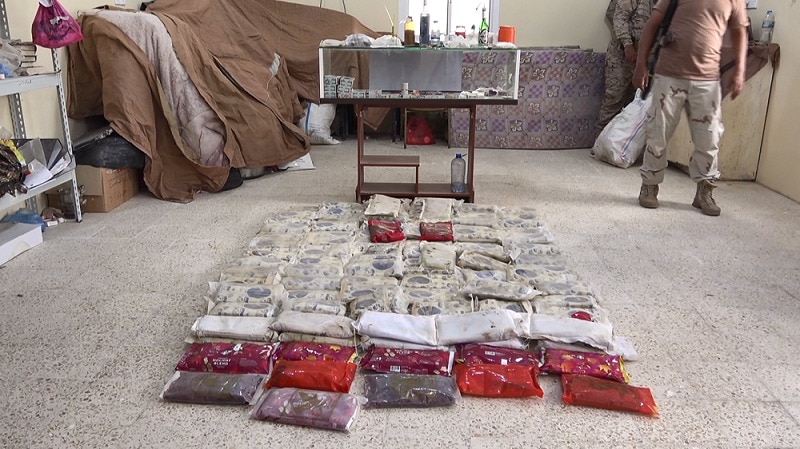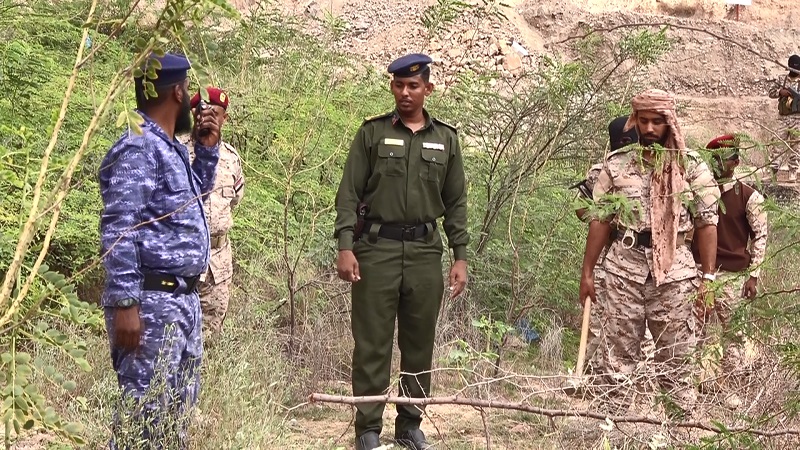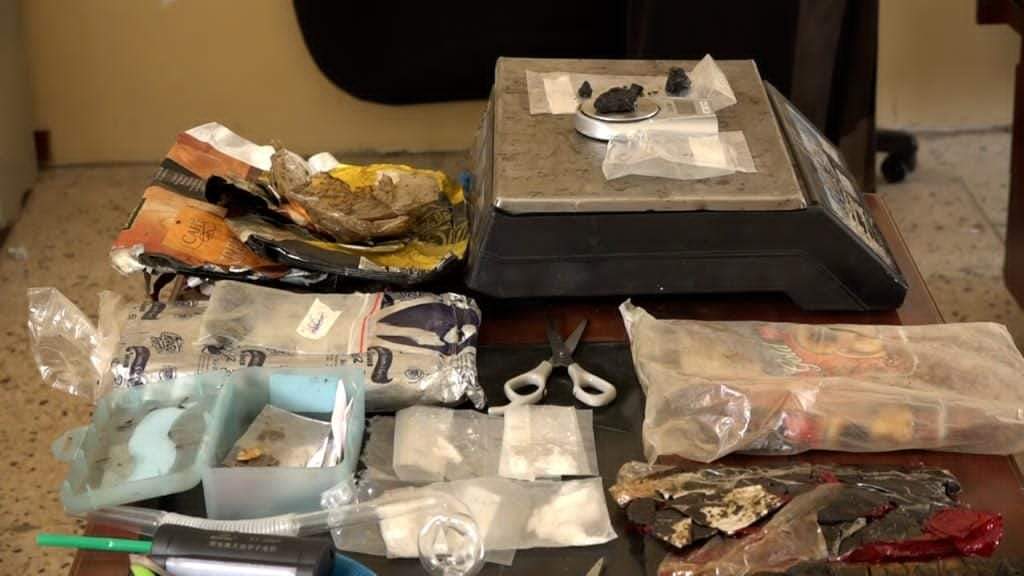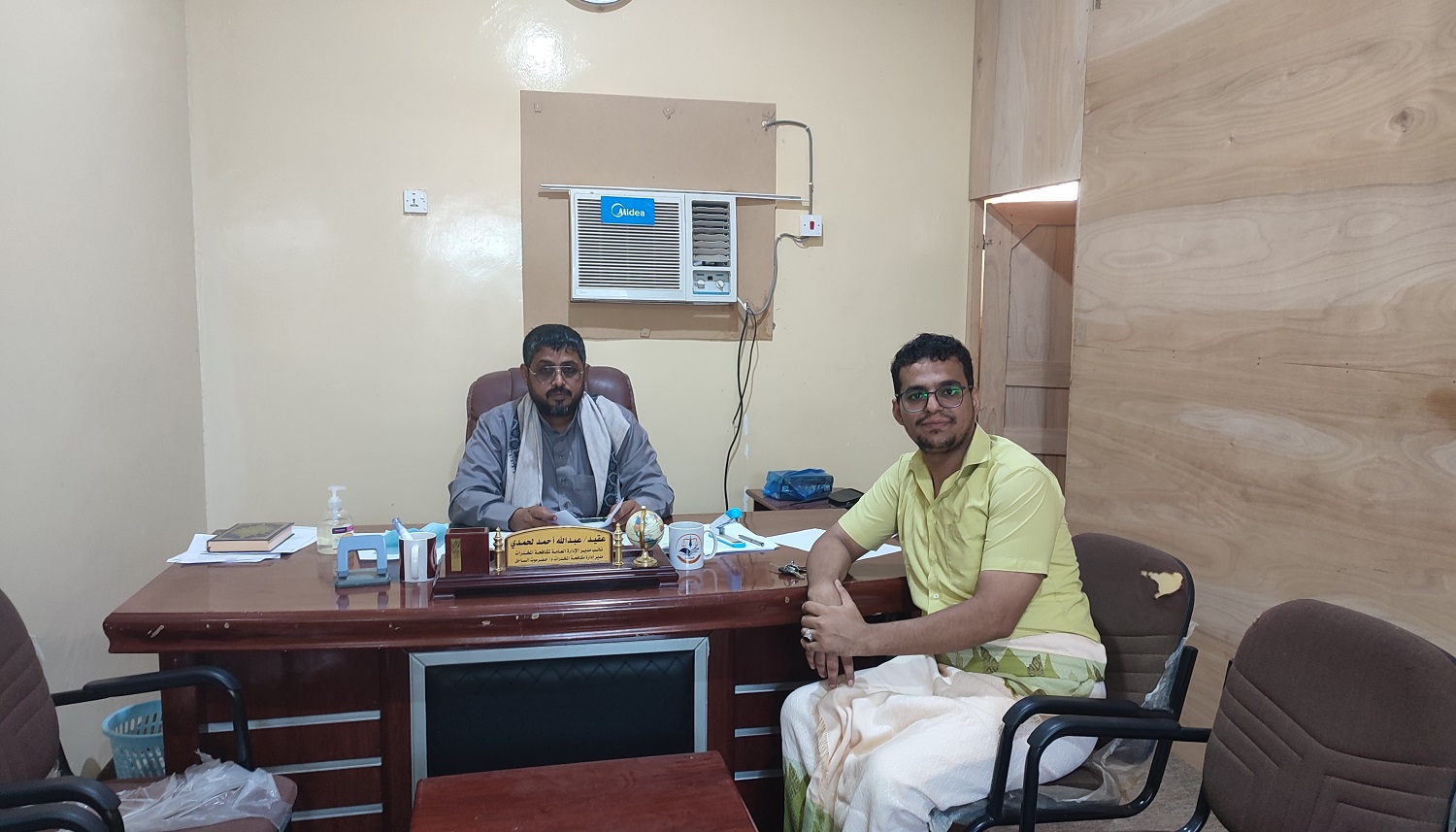
150 kg of Hashish seized during a raid on a farm in the Raydah and Qusayr districts in Hadramout on Jan10th 2023 (Zakaria Mohammed)
Last updated on: 07-03-2023 at 3 PM Aden Time

Abdullah Al-Shadli (South24)
The governorate of Hadramout in South Yemen is among the most affected by the dangers of drugs with all their kinds, especially the plant-based ones such as hashish. Its big geographical area and its open land and sea borders complicate the combat process.
What further increases the problem is that Hadramout is also considered an active transit point for large amounts of drugs entering Yemen to settle in other governorates. Additionally, there is growing information that some areas in the governorates host labs to produce synthetic drugs.
At an earlier time, “South24 Center” obtained information and photos which revealed a factory to produce methamphetamine in Wadi Hadramout. Exclusive local sources claimed that there are other factories and labs that produce some kinds of drugs in Wadi Hadramout.
Related: «Methamphetamine»: «Master Killer» Produced in Wadi Hadramout
Hashish and pills
Hashish, which is extracted from Indian “Cannabis Sativa”, comes on top of the most prevalent plant-based drugs in Hadramout according to Colonel Abdullah Lahmadi, Head of the Drug Enforcement Administration in the Coast of Hadramout who was recently appointed as Head of Drug Enforcement Administration in Yemen.
Lahmadi told “South24 Center”: “The biggest part of plant-based drugs flows into Hadramout through the nearby Al-Mahra governorate while synthetic drugs and narcotic pills often flow from the Northern governorates controlled by the Houthi militias”.
Basically, Pakistan, Afghanistan and Iran are considered among the biggest producers of plant-based drugs such as “hashish” according to a report issued by the “International Narcotics Control Board” in 2021. Colonel Lahmadi confirms that these countries are actually the most prominent source of drugs which enter Hadramout.
In October 2018, authorities in Al-Mahra governorate announced seizing 1.5 tons of hashish in the coasts of Huswain district. In October 2020, they announced seizing an amount of hashish, heroine, and narcotic pills. In April 2021, security officials in Al-Mahra announced seizing a boat loaded with hashish off the coasts of Al-Ghayda District.
Lahmadi praised these security achievements in Al-Mahra adding that the role of the authorities in the governorate has significantly contributed in preventing the arrival of large amounts of drugs to Hadramout and other governorates.
Official sources in the Drug Enforcement Administration in Hadramout provided “South24 Center” with statistics related to the official hashish seizure in 2022 which amounted to about 25.5 kg in the coast, and approximately 5 kg in Wadi Hadramout.
Legal researcher Adeeb Bagbran raises doubts regarding the accuracy of these statistics. He told “South24 Center”: “I trust the integrity of the Drug Enforcement Administration but I think that there are big amounts of drugs that have not been detected or seized, especially in the valley and the desert of Hadramout”.
Colonel Lahmadi declined to comment on the official seizure statistics but he underscored the continuous efforts to track drug abusers and dealers.
He pointed out that Pakistian, Afghanistan and Iran are “the main countries which export drugs such as hashish and opium. Al-Mahra is the biggest outlet for the flow of drugs till now. We fear that other governorates will be involved”.
Lahmadi pointed to an incident that occurred in Last December when a drug vessel crashed off Abyan coasts. On December 7th, residents found amounts of hashish and methamphetamine in the coasts of Shuqrah and Ahwar. Later, security bodies explained that they belong to a drug vessel which crashed in the sea.
Lahmadi said: “This is a dangerous indicator that Shabwa, Abyan and Aden entered the smuggling system”. However, unlike hashish, the narcotic pills trade comes through the Houthi-controlled North Yemen rather than through Al-Mahra according to Lahmadi.
He added: “We have documented information about amounts of narcotic pills which come from the Houthi-controlled areas and even enter the Saudi territories”. The local official claimed that the narcotic pills are being smuggled from the Areas controlled by the Iran-backed Houthis by using drones.
He explained: “We have proven that the narcotic pills come from the western side through Hodeidah in North Yemen. There have been recent exchange deals between drug dealers in Yemen including hashish and captagon, especially in Marib and Al-Jawf".
On Sunday, the US Navy announced seizing illegal drugs worth $20 million from a fishing vessel in the Arabian Sea. The statement said that the shipment included “1,350 kg of hashish, 276 kg of methamphetamine and 23 kg of amphetamine pills”.
On February 28 2019, the First Military District in Wadi Hadramout announced “destroying 20 tons and narcotic pills in the city of Seiyun, under the instructions of the Public Prosecutor and the supervision of the Specialized Criminal Prosecution”.
However, exclusive sources told “South24 Center” that “the amounts of drugs destroyed by the Coalition's representatives in Wadi Hadramout and Drug Enforcement Administration in Hadramout’s coast don’t exceed 8 tons”. “South24 Center” has not been able to reach the leadership of the First Military District to comment on the accusations. The amount of hashish (about 150 kilograms) which was detected at a farm in the Raydah and Qusayr districts in Hadramout on Jan10th 2023 are among the largest in the coast of Hadramout. According to Colonel Lahmadi, this amount is considered an immense one in comparison with the small quantities that were seized on the coast of Hadramout during 2022.

Soldiers affiliated with the Drug Enforcement Administration during a raid on a farm in the Raydah and Qusayr districts in the Coast of Hadramout, Jan 10th 2023 (Zakaria Mohammed)
Raw opium
In mid-November, the Drug Enforcement Administration in the Coast of Hadramout seized a large amount of drugs including a quantity of raw opium for the first time. Despite the small amount seized which didn’t exceed 12 gm, Colonel Lahmadi believes that it is a “dangerous indicator”.
He said: “the amount, even though very small, remains a dangerous indicator that raw opium began to enter Hadramout”. Raw opium is a substance extracted from “poppy” from which 22 drugs are produced, the most dangerous of which is heroin.

Amounts of drugs including raw opium seized in the city of Mukalla, November 14th 2022 (deraalganoob.com)
Lahmadi pointed out that they have information which reveals drug synthesis factories Moreover, there are other factories to recycle the shoddy or damaged hashish due to the poor storage. All of them are in Wadi Hadramout.
He added: “This information just needs to be proven”.
Northern brigades are spread in Hadramout as part of the First Military District. The topography of the area provides a suitable environment for smuggling activities and natural cover for them.
According to Colonel Lahmadi, “drug smugglers use the coast for smuggling and the Wadi for storage”. He pointed out that there is somewhat security control in the coast’s areas better than any other internal area”.
Smugglers
Although a large number of those who were arrested in cases related to drug smuggling or trafficking in Hadramout are from the same governorate, there is a significant number of smugglers from North Yemen.
Judicial sources told “South24 Center” that “the Northern forces in Wadi Hadramout provide cover and protection for smugglers”.
The sources said that “a number of Northern smugglers were seized in 2019 in Seiyun International Airport after an attempt to smuggle kilograms of drugs. The airport’s security affiliated with the First Military District detained them and refused to extradite them to the relevant authorities.
The sources explained that the Specialized Criminal Prosecution repeatedly addressed the authorities of Wadi Hadramout and the 1’st Military District without receiving a response. “South24 Center” sought to contact the Specialized Criminal Prosecution but we have not received a response yet.
Article (33) of Law No. (3) of 1993 regarding combating trafficking and illegal use of narcotics and psychotropic substances imposes the death penalty on every one who exports or brings narcotics substances with the intent of trading or promotion.
Dire effects
According to Colonel Lahmadi, 80% of the crimes alien to society in Hadramout, such as murder, rape and incest are caused by psychotropic substances in general, foremost of which are drugs with all their kinds and forms.
He added: “Recently, there has been a remarkable increase of female involvement in cases of drug promotion and abuse. This is a dangerous and bad indicator”. He said that the Drug Enforcement Administration in the Coast of Hadramout suffers from lack of support and poor capabilities.

South24 Center correspondent with Colonel Abdullah Lahmadi Head of the Drug Enforcement Administration in Yemen
Dr. Sami Bin Dahri stresses the big danger related to drugs, especially “hashish”, the most common and prevalent one. He told “South24 Center” that “hashish is one of the strongest kinds of drugs which causes addiction”.
He concluded: “Hashish has many side effects as it causes (a motivational syndrome) which makes the addict in a state of frustration and has no motive to do any activity except for obtaining hashish”.